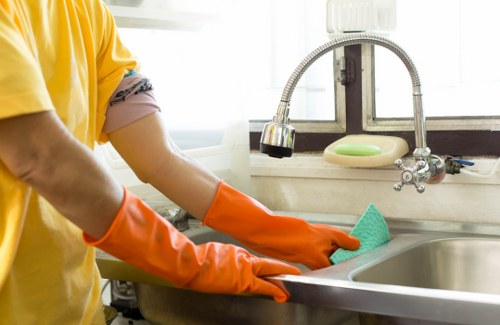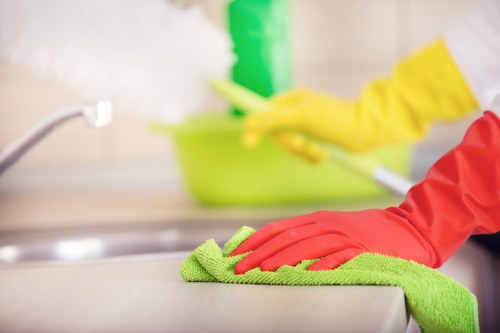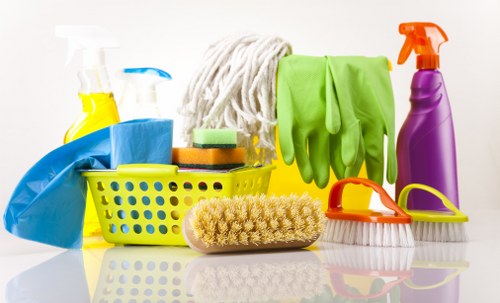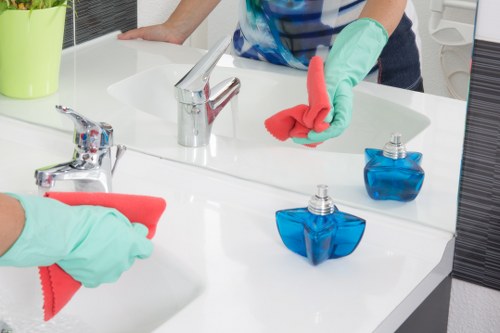Comprehensive Guide to Oven Cleaning in Reading

Keeping your oven clean in Reading is essential for both the longevity of your appliance and the quality of your cooking. Whether you're a homeowner or a renter, maintaining a clean oven can prevent unpleasant odors, reduce the risk of fires, and ensure that your meals taste their best.
Oven cleaning might seem like a daunting task, but with the right techniques and tools, it can be manageable and even satisfying. This guide will walk you through everything you need to know about oven cleaning in Reading, from choosing the right cleaning products to understanding the best practices for maintaining a spotless oven.
Before diving into the cleaning process, it's important to understand why regular oven maintenance is necessary. A dirty oven not only affects the performance of your cooking but can also lead to higher energy consumption. By keeping your oven clean, you ensure that it operates efficiently, saving you both time and money in the long run.

Why Regular Oven Cleaning is Important
Regular oven cleaning in Reading helps in several ways:
- Improved Cooking Performance: A clean oven ensures even heat distribution, which is crucial for baking and roasting.
- Health Benefits: Removing grease and food residues prevents the buildup of harmful bacteria and unpleasant smells.
- Energy Efficiency: A clean oven operates more efficiently, reducing energy consumption and lowering utility bills.
- Prevents Fire Hazards: Accumulated grease and food particles can ignite, posing a significant fire risk.
Understanding these benefits reinforces the importance of incorporating oven cleaning into your regular household maintenance routine.
Moreover, a clean oven contributes to the overall hygiene of your kitchen, making it a safer and more pleasant environment for cooking and dining.
Neglecting oven maintenance can lead to stubborn stains and buildup that are much harder to remove over time, making the task even more challenging in the future.

Essential Tools and Cleaning Products
To effectively clean your oven in Reading, you'll need the right tools and cleaning products. Here's a list of essential items:
- Protective Gear: Gloves and safety goggles to protect your hands and eyes from harsh chemicals.
- Oven Cleaner: Choose a high-quality, non-toxic oven cleaner that suits your preferences.
- Baking Soda and Vinegar: Natural alternatives for those who prefer eco-friendly cleaning solutions.
- Scrub Brushes and Sponges: For scrubbing off stubborn grease and grime.
- Microfiber Cloths: To wipe down surfaces and ensure a streak-free finish.
Having these tools on hand will make the cleaning process more efficient and effective, allowing you to tackle even the toughest stains with ease.
Additionally, consider using oven liners to catch spills and prevent future buildup, making cleanup tasks simpler and less time-consuming.

Step-by-Step Oven Cleaning Process
Follow these steps to achieve a sparkling clean oven:
1. Preparation
- Ensure the oven is completely cool before starting the cleaning process.
- Remove all racks, trays, and any other removable parts from the oven.
- Lay down newspapers or protective coverings to catch any drips or spills.
2. Applying the Cleaner
Apply your chosen oven cleaner evenly across the interior surfaces, avoiding heating elements. Let it sit for the recommended time to break down grease and grime.
3. Scrubbing and Cleaning
Use scrub brushes and sponges to remove loosened debris. Pay special attention to stubborn areas, applying more cleaner as needed.
4. Wiping Down
Once all grime is removed, use microfiber cloths to wipe down the oven thoroughly, ensuring no residue is left behind.
5. Cleaning Removable Parts
Soak the racks and trays in a mixture of warm water and dish soap. Scrub them clean and rinse thoroughly before drying and replacing them in the oven.

Maintenance Tips for a Clean Oven
To keep your oven in top condition, follow these maintenance tips:
- Regular Wiping: After each use, wipe down spills and splatters to prevent buildup.
- Use Oven Liners: Place liners on the bottom rack to catch drips and crumbs.
- Periodic Deep Cleaning: Schedule a deep clean at least once every few months to address any accumulated grime.
- Ventilation: Use your oven's ventilation system to reduce moisture and odors.
- Avoid Harsh Scrubbing: Use gentle cleaning motions to preserve the oven's interior surfaces.
Implementing these practices will make your oven easier to clean and maintain, extending its lifespan and ensuring it performs efficiently.
Additionally, consider scheduling professional oven cleaning services in Reading for a thorough and hassle-free experience, especially if dealing with heavily soiled appliances.
By adopting these habits, you'll ensure that your oven remains a reliable and clean tool in your kitchen for years to come.
Local Oven Cleaning Services in Reading
If you prefer professional assistance, Reading offers a variety of oven cleaning services to suit your needs. These services provide expertise and thoroughness that can save you time and effort.
- Eco-Friendly Cleaners: Services that use environmentally safe products to protect your health and the planet.
- Express Cleaning: For those who need quick turnaround times without compromising quality.
- Deep Cleaning Specialists: Experts who handle tough stains and provide comprehensive oven maintenance.
- Affordable Packages: Various pricing options to fit different budgets without sacrificing service quality.
Choosing a local oven cleaning service in Reading ensures that you receive personalized and convenient support, tailored to your specific cleaning requirements.
Additionally, many local services offer flexible scheduling, allowing you to book appointments that fit seamlessly into your busy lifestyle.
Nearby Areas Offering Oven Cleaning Services
In addition to Reading, several nearby areas offer excellent oven cleaning services:
- Wokingham: Just a short drive from Reading, offering a range of professional cleaning services.
- Henley-on-Thames: Known for its reliable and thorough cleaning experts.
- Maidenhead: Provides eco-friendly and affordable oven cleaning options.
- Bracknell: Offers quick and efficient service with flexible scheduling.
- Camberley: Features specialized deep cleaning services for heavily soiled ovens.
- Twyford: Known for its high-quality and customer-focused cleaning professionals.
- Newbury: Offers comprehensive cleaning packages tailored to individual needs.
- Finchampstead: Provides detailed and meticulous oven cleaning services.
- Earley: Features affordable and reliable cleaning solutions.
- Southcote: Known for its prompt and thorough cleaning professionals.
- Sonning: Offers premium cleaning services with attention to detail.
- Tilehurst: Provides a variety of oven cleaning options to suit different preferences.
These areas complement Reading by offering diverse and specialized oven cleaning services, ensuring that residents have access to top-notch cleaning solutions close to home.
Whether you live in a bustling suburb or a quiet village near Reading, you can find a service that meets your specific oven cleaning needs.
By leveraging local expertise, you can enjoy a clean and efficient oven without the hassle of extensive DIY efforts.
Choosing the Right Oven Cleaning Method
There are various methods to clean your oven in Reading, each with its own benefits:
Chemical Cleaners
Chemical oven cleaners are effective at removing tough grease and burnt-on food. They work by breaking down grime, making it easier to wipe away.
Natural Cleaners
For those who prefer eco-friendly options, natural cleaners like baking soda and vinegar are excellent alternatives. They are safer for you and the environment.
Steam Cleaning
Steam cleaning uses hot steam to loosen dirt and grease without the need for harsh chemicals. It's a gentle yet effective method suitable for regular maintenance.
Self-Cleaning Function
Many modern ovens come with a self-cleaning feature that uses high temperatures to burn off residue. While convenient, it requires careful handling and thorough ventilation.
Professional Cleaning
Hiring professionals ensures a thorough and efficient cleaning process. They have specialized equipment and expertise to handle even the most stubborn stains.
Safety Tips for Oven Cleaning
- Ventilate the Area: Ensure proper ventilation by opening windows and doors to avoid inhaling fumes from cleaning products.
- Wear Protective Gear: Always wear gloves and goggles to protect your skin and eyes from harsh chemicals.
- Follow Product Instructions: Carefully read and follow the instructions on any cleaning product you use.
- Avoid Mixing Cleaners: Do not mix different cleaning agents as this can create toxic fumes.
- Unplug the Oven: For electrical safety, unplug your oven before starting the cleaning process.
- Test for Sensitivity: If using natural cleaners, test them on a small area first to ensure they don't damage the oven's surface.
Adhering to these safety guidelines will prevent accidents and ensure a safe and effective oven cleaning experience.
Additionally, always keep cleaning products out of reach of children and pets to avoid any accidental ingestion or exposure.
By prioritizing safety, you can perform oven cleaning tasks with confidence and peace of mind.
Common Oven Cleaning Mistakes to Avoid
When cleaning your oven in Reading, be mindful of common mistakes that can lead to ineffective cleaning or damage:
- Using Abrasive Tools: Scrubbing with harsh abrasives can scratch and damage the oven's interior surfaces.
- Ignoring Manufacturer's Instructions: Not following the oven manufacturer's cleaning guidelines can void warranties and potentially harm the appliance.
- Not Cleaning Regularly: Allowing grime to build up makes cleaning more difficult and reduces the oven's efficiency.
- Overusing Chemical Cleaners: Excessive use of chemicals can leave residues that affect the taste of your food and harm your health.
- Neglecting Removable Parts: Forgetting to clean racks and trays can result in uneven oven cleanliness and lingering odors.
Avoiding these pitfalls ensures that your oven remains in excellent condition and functions optimally.
Additionally, always allow adequate drying time after cleaning to prevent moisture-related issues such as rust or mold growth.
Being aware of these mistakes will help you maintain a clean and safe oven environment.
Environmental Considerations in Oven Cleaning
Choosing environmentally friendly oven cleaning methods is not only beneficial for your health but also for the planet. Here are some green cleaning tips:
- Use Natural Cleaners: Opt for baking soda, vinegar, and lemon juice instead of harsh chemical cleaners.
- Minimize Plastic Use: Select cleaning products with minimal plastic packaging to reduce waste.
- Recycle Cleaners: Properly recycle any chemical cleaners you use in accordance with local regulations.
- Energy-Efficient Practices: Utilize the oven's self-cleaning feature sparingly to save energy.
- Compost Leftover Waste: Compost organic waste removed during the cleaning process when possible.
Incorporating these eco-friendly practices into your oven cleaning routine contributes to a healthier home and a more sustainable environment.
Furthermore, choosing biodegradable and non-toxic cleaning agents reduces the environmental impact and ensures that you are not introducing harmful substances into your living space.
Adopting green cleaning methods reflects a commitment to both personal well-being and environmental stewardship.
Cost-Effective Oven Cleaning Solutions
Maintaining a clean oven doesn't have to be expensive. Here are some cost-effective cleaning solutions:
- DIY Cleaners: Use common household items like baking soda and vinegar to create effective cleaning pastes.
- Regular Maintenance: Prevent buildup by wiping down your oven after each use, reducing the need for intensive cleaning.
- Buy in Bulk: Purchase cleaning supplies in bulk to save money over time.
- Invest in Oven Liners: These liners catch spills, making subsequent cleanings easier and less time-consuming.
- Use Reusable Cleaning Tools: Invest in durable scrub brushes and microfiber cloths that can be used repeatedly.
These strategies help minimize cleaning costs while maintaining an effective and clean oven.
Additionally, regular care and maintenance can extend the lifespan of your oven, providing greater value for your investment.
By prioritizing cost-effective methods, you can achieve a spotless oven without straining your budget.
When to Hire a Professional Oven Cleaner
While DIY cleaning is effective for routine maintenance, there are times when hiring a professional oven cleaner in Reading is the best option:
- Severe Build-Up: When grease and grime have accumulated to the point where DIY methods are ineffective.
- Time Constraints: If you're short on time and need a quick, thorough cleaning.
- Specialized Cleaning Needs: Ovens with self-cleaning features or specific materials may require expert handling.
- Health Concerns: Professionals can safely handle and dispose of strong cleaning chemicals.
- Preserving Appliance Integrity: To avoid accidental damage, especially with high-end or sensitive ovens.
Choosing professional services ensures a deep clean and restores your oven to optimal condition without the stress and effort involved in DIY methods.
Moreover, professionals often provide guarantees, offering peace of mind that your oven will be cleaned to the highest standards.
Consider hiring professionals when the task exceeds your comfort level or available resources, ensuring the best possible results.
Benefits of Regular Oven Maintenance
Regular oven maintenance offers numerous advantages:
- Enhanced Cooking Quality: Consistent heat distribution results in better-tasting meals.
- Increased Appliance Lifespan: Proper maintenance reduces wear and tear, extending the oven's usability.
- Cost Savings: Efficient ovens consume less energy, lowering utility bills over time.
- Improved Safety: Reduces the risk of fires and eliminates potential health hazards from built-up grime.
- Aesthetic Appeal: A clean oven contributes to the overall look and feel of your kitchen.
Prioritizing regular maintenance ensures your oven remains a reliable and efficient appliance in your home.
Additionally, routine checks and cleanings can identify potential issues early, preventing costly repairs or replacements in the future.
Investing time in maintenance today leads to long-term benefits and a more enjoyable cooking experience.
Choosing Eco-Friendly Oven Cleaning Products
Eco-friendly oven cleaning products are a great choice for those who want to minimize their environmental impact while maintaining a clean kitchen:
- Non-Toxic Ingredients: Look for cleaners free from harmful chemicals like ammonia and chlorine.
- Biodegradable Formulas: Ensure that the products break down naturally without polluting water sources.
- Recycled Packaging: Select products packaged in recyclable or reused materials to reduce waste.
- Plant-Based Cleaners: Utilize cleaners derived from natural plant sources for effective and safe cleaning.
- No Animal Testing: Choose brands that do not test their products on animals, supporting ethical practices.
These products not only protect the environment but also create a healthier home environment by reducing exposure to toxic substances.
Additionally, eco-friendly cleaners often come with concentrated formulas, meaning less packaging and reduced carbon footprint in transportation.
By opting for green cleaning solutions, you contribute to sustainable living while keeping your oven spotless.
Top Tips for a Spotless Oven
- Wipe Spills Immediately: Prevent buildup by cleaning spills as soon as the oven cools down.
- Use Baking Soda Paste: Apply a paste of baking soda and water to stubborn stains for easy removal.
- Regularly Clean Racks: Remove and clean racks regularly to avoid grease accumulation.
- Schedule Deep Cleans: Set reminders to perform deep cleaning sessions several times a year.
- Keep the Door Open: After cleaning, leave the oven door open to allow it to dry completely.
Implementing these tips helps maintain a consistently clean oven, making each cleaning session easier and more effective.
Additionally, keeping a cleaning schedule ensures that you stay on top of maintenance tasks, preventing the need for intensive cleaning efforts.
By following these strategies, you can enjoy a kitchen with a clean and efficient oven year-round.
Conclusion
Oven cleaning in Reading is an essential aspect of household maintenance that offers numerous benefits, from improved cooking performance to enhanced safety and energy efficiency. By utilizing the right tools, following effective cleaning methods, and adhering to regular maintenance schedules, you can keep your oven in excellent condition.
Whether you choose to tackle the task yourself or hire professional services, understanding the importance and techniques of oven cleaning ensures that your kitchen remains a healthy and efficient space for cooking and gathering.
Embrace these practices and enjoy the benefits of a spotless, well-maintained oven that serves you reliably for years to come.
Frequently Asked Questions
1. How often should I clean my oven?
It's recommended to clean your oven at least once every three months. However, if you use your oven frequently, more frequent cleaning may be necessary to prevent buildup.
2. Can I use baking soda and vinegar to clean my oven?
Yes, baking soda and vinegar are effective natural cleaners. They can help remove grease and stains without the use of harsh chemicals.
3. Is it safe to use self-cleaning functions on my oven?
Yes, but ensure that your oven is free from large food debris before using the self-cleaning feature. Follow the manufacturer's instructions carefully for safe and effective use.
4. What should I do if my oven has stubborn stains?
For stubborn stains, consider using a strong oven cleaner or hiring a professional cleaning service to ensure thorough removal without damaging the oven.
5. Are professional oven cleaning services worth the cost?
Professional services are worth the cost if you want a deep clean without the hassle or if your oven has significant buildup that is difficult to remove with DIY methods.

